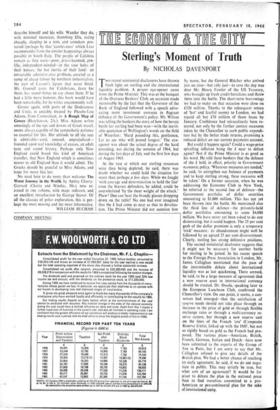Ends of the Earth
'EVERY age presumably dreams of escaping its bonds, but Europe in the 1770s seems to have been especially ripe for the notion of an earthly paradise. . . In April 1769, Captain James Cook reached Tahiti in the 'Endeavour'—not the first white man to be seen there, but the first to stay long, for a scientific purpose, and return. 'Endeavour's' ar.-ival in England in 1771, stuffed with scientific curios and tales of gay, promis- cuous islanders, touched off speculation and controversy all over Europe. In The Fatal Impact, by Alan Moorehead (Hamish Hamil- ton, 30s.), the title refers to the result, for the Tahitians and others, of the voyages undertaken, for the good of science, by Captain Cook. Cook was impressive, unquestionably an advanced and admirable man; yet by opening up the Pacific, Australia and Antarctica to all who might follow, he was (in a sense) directly responsible for the destruction of the Pacific Islanders, the Australian aborigines, and the whales, seals and other wildlife of the southern seas by, in the first cases, drink, firearms, gold, violence and VD; and in the last, the American whalers.
The worst effects are over. Only the aborigines, now, can never recover. Tahiti, no longer a golden link with the far past, is orderly, pros- perous, a tourists' paradise. The seals are multi- plying once more. Under the ice, scientists proceed in a disciplined manner—'it is the troglo- dyte's existence carried to the last extreme . . . a capsule world such as, no doubt, they will establish on the moon one day.' Our century's escape fantasy is space-travel; a shiny dream to take our eyes off our own shabbiness. Only this time there will be no Noble Savages, no sexual free-for-all, no fairy fruits and flowers —just a pinch of sidereal dust, valueless even as snuff. A timely book, Mr. Moorehead's, to make us re-examine our neuroses, and regret the irreplaceable beauties we have, with such good scientific intentions, destroyed.
At the very start of Edward Lear in Greece (William Kimber, 50s.), the description of land- ing at Salonica in 1848 recalls Violet, Slingsby, Guy and Lionel. 'The enthusiastic Israelites rushed into the water and, seizing my arms and legs, tore me out of the boat and up a narrow board with the most unsatisfactory zeal.' How pleasant to travel with Mr. Lear, who faced the shattering discomforts of Albania and Greece with such uncomplaining, humorous fortitude; who loved all he saw of landscape—here copiously reproduced in lithograph—and much of people; who, having longed a lifetime to see the Vale of Tempe, was gently disappointed to find it a gorge; who, when asked by the Bey of Kroia to describe steamboats and trains, gave an imitation of both so enchanting that he was obliged to repeat it many times.
No one who served in Eastern India in war- time could fail to know the Calcutta Statesman and its stormy-petrel editor, Ian Stephens, author of Monsoon Morning (Benn, 45s.). No one who saw the famine of 1943 could fail to respect him for the risks he took to batter 'Government' into a sense of responsibility. Winchester and Cambridge bred this 'rather priggish but warm- hearted young Liberal.' He became editor, in 1942, of the influential English-owned Statesman —a journalistic opportunity of the first order: 'The public looked to us for views. And "leaders" in the Indian press were meant in good old Victorian fashion to lead, not equivocate, as seemed a growing tendency in Britain.' The opportunity was taken, and the formerly shy young man made delighted discovery of a latent talent for belligerence. The book goes breath- lessly fast, as though the rotaries were waiting, but it is consistently interesting, honest and (in spite of much provocation) fair.
Bryn Gunnell, in his introduction to Calabrian Summer (Hart-Davis, 32s. 6d.), chooses 'wan- derer'—he thinks 'traveller' old-fashioned—to describe himself and his wife. Wander they do, with minimal resources, thumbing lifts, eating cheaply, sleeping in a tent, and somehow pro- tected (perhaps by that 'carelessness' which Lear recommends) from the sinister happenings always possible in South Italy. The people of Calabria remain as they were-poor, priest-haunted, pro- lific, independent-minded-in the sour holes of their houses, the hot inertia of their land : an intractable administrative problem, coveted as a sump of cheap labour by northern industrialists, the part of Cavour's jigsaw that never fitted. Mr. Gunnell cares for Calabrians, fears for them, has sound things to say about them. If he had a little more humour, this book would have been remarkable, for he writes uncommonly well.
Greece again, with parts of the Dodecanese and Crete, is amiably treated by Phoebe-Lou Adams, from Connecticut, in A Rough Map of Greece (Hutchinson, 25s.). Miss Adams writes amusingly of the ups and downs of Greek travel, stems always capable of the sympathetic patience so essential for this. Her attitude to all she sees is admirable-cool, amused, unprejudiced- founded upon real knowledge of causes, an adult taste and sound history. Perhaps only New England could breed this kind of American traveller, that New England which is sometimes nearer to old England than it would admit. The Greeks should be grateful to Miss Adams, and hope for more like her.
No need here to do more than welcome The Worst Journey in the World, by Ansley Cherry- Garrard (Chatto and Windus, 30s.), now re- issued in one volume, with maps redrawn, and an excellent introduction by George Seaver. Of all the classics of polar exploration, this is per- haps the most moving and the most informative. WILLIAM BUCHAN































 Previous page
Previous page